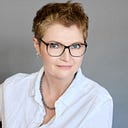Member-only story
We Need To Change The Way We Talk About Autistic Kids
Language matters and the wrong choices can be objectifying and disrespectful
As an autistic adult, I’m fortunate to a enjoy certain amount of autonomy and agency. I can make decisions about how I identify and how I express that to the outside world. I’ve been able to draw on the diverse lived experiences of other autistics to guide me in that journey.
But that’s not the case for many autistic children whose identity is still very much shaped by non-autistic adults. Children have little control over how they are portrayed in the media, the language used by service providers or even how their parents talk about them.
So much of the dominant narrative of autism is about the experience of families and more to the point, the imposition on them of having an autistic child. Media coverage about funding for support services tends to focus on the making life run more smoothly for parents by eliminating the stress of having an autistic child.
The autistic child is the object in a story told by the adults responsible for them and is denied recognition of their subjective experience. It’s not that the parents' experiences are irrelevant, but they shouldn’t be the focus. But rarely do I see the child’s perspective about their needs and how…
